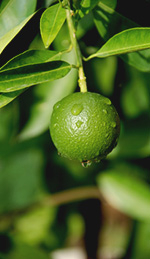 Is there anything more refreshing than the smell of fresh oranges in the morning? There’s a reason why so many people can’t do without their breakfast glass of orange juice, and essential oils distilled from citrus fruits such as bergamot, sweet orange, and petitgrain have the same awakening qualities. Perfect for direct inhalation as a sort of “scent therapy” to alleviate feelings of gloom or the winter blues, petitgrain essential oil also has antibacterial, antispasmodic, and astringent properties [1] that make it a superstar in treating ailments from your head to your toes! Read on to discover the time-tested ways petitgrain oil has been used in aromatherapy and spa treatments.
Is there anything more refreshing than the smell of fresh oranges in the morning? There’s a reason why so many people can’t do without their breakfast glass of orange juice, and essential oils distilled from citrus fruits such as bergamot, sweet orange, and petitgrain have the same awakening qualities. Perfect for direct inhalation as a sort of “scent therapy” to alleviate feelings of gloom or the winter blues, petitgrain essential oil also has antibacterial, antispasmodic, and astringent properties [1] that make it a superstar in treating ailments from your head to your toes! Read on to discover the time-tested ways petitgrain oil has been used in aromatherapy and spa treatments.
Modern petitgrain oil is distilled from the leaves and twigs of the bitter orange tree (Citrus aurantium), which is also the source of the delicately floral neroli essential oil. Though it is sometimes used as a substitute for neroli oil in fragrances—in fact, petitgrain oil is even sometimes nicknamed “poor man’s neroli”—petitgrain oil has a woodier, more herbaceous scent that distinguishes it from its more floral relative [1]. However, both types of oil have been used in perfumes, bathwaters and colognes since the 1700s for their pleasant, floral-citrusy scent, ability to tighten and moisturize the skin, and reputed aphrodisiac effects. Today, petitgrain oil is mainly produced in Paraguay and France, with the French variety said to have a longer-lasting, more intense aroma. The name “petitgrain” also comes from the French, meaning “little grain”, a reference to the old practice of distilling petitgrain oil from the green, unripe bitter oranges when they were still the size of cherries! Nowadays, because it is more economical, most producers harvest the leaves and twigs of the bitter orange tree to distill petitgrain oil.
All citrus oils seem to have uplifting and cheering effects on the mood, and petitgrain essential oil is no exception. The easiest way to use petitgrain oil is simply to inhale its sharp fragrance right from the bottle for an instant dose of cheer! Just the smell of petitgrain oil is thought to refresh the mind and fight “brain fog”, confusion, mental fatigue or stress, and mild cases of the blues. In a massage or blended into a moisturizing lotion, petitgrain essential oil can decongest oily skin and scalp and help clear up skin conditions such as acne and other blemishes [2]. The oil’s antispasmodic properties can ease nervous tension, tight muscles, and even indigestion and stomach cramps by relaxing spasms in smooth muscle [3]. Finally, due to its antiseptic and antibacterial effects [4], petitgrain oil can be inhaled from a diffuser or added to bath water to fight infections, especially colds and other upper respiratory ailments.
Like its cousin neroli, petitgrain oil is generally considered non-sensitizing and non-irritating. Because it is distilled from the leaves and twigs rather than the fruit peel of the bitter orange, petitgrain oil does not contain the coumarins found in citrus peel that can cause photo-sensitization when exposed to sunlight [3].
In our opinion, it’s hard to create a bad blend with petitgrain oil—it works with many different essential oils!—but the absolute yummiest combinations we’ve discovered pair petitgrain oil with other citrus oils such as bergamot, neroli, lime and sweet orange; woody oils such as cypress and sandalwood; and floral scents such as clary sage, geranium, lavender, jasmine, and ylang ylang.
REFERENCES
1. “Health Benefits of Petitgrain Essential Oil. Organic Facts. Accessed April 23rd, 2014. http://www.organicfacts.net/health-benefits/essential-oils/health-benefits-of-petit-grain-essential-oil.html.
2. Ryman, Danièle. “Petitgrain Essential Oil”. Aromatherapy Bible. Accessed April 22nd, 2014. http://www.aromatherapybible.com/petitgrain.html.
3. Martin, Ingrid. 2006. Aromatherapy for Massage Practitioners. Lippincott Williams and Wilkins.
4. “Petitgrain (Bigarde) Essential Oil Aromatherapy.” Annie’s Aromatherapy. Accessed April 22nd, 2014. http://www.anniesaromatherapy.com/Petitgrain.php.
